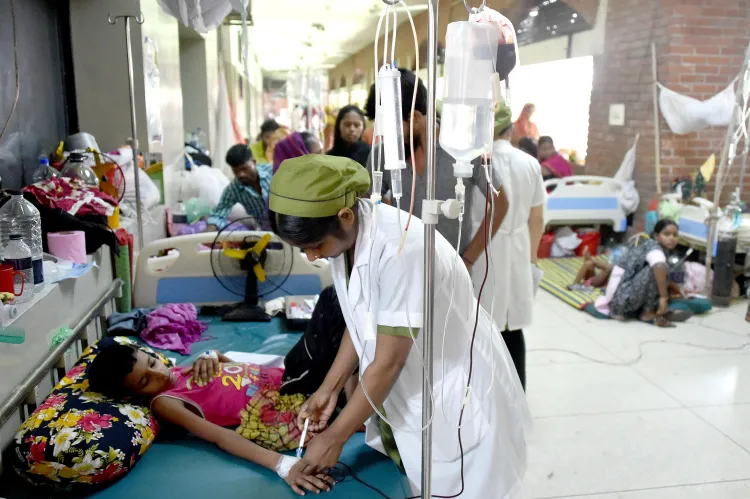How is the Dengue Outbreak Impacting Bangladesh?

Synopsis
Key Takeaways
- Dengue cases in Bangladesh are significantly rising.
- Six new deaths reported in the last 24 hours.
- Total fatalities now stand at 313.
- Early detection and treatment are crucial for recovery.
- Public awareness and preventive measures are essential.
Dhaka, Nov 9 (NationPress) The dengue outbreak in Bangladesh is escalating alarmingly, with a significant increase in both infections and fatalities nationwide. In the past 24 hours, six individuals succumbed to the disease, pushing the total death toll from this mosquito-borne illness to 313, as reported by local media.
During the same timeframe, 1,195 additional patients were admitted to hospitals, bringing the total number of dengue cases in 2025 to 78,543, according to the Directorate General of Health Services (DGHS), as reported by United News of Bangladesh.
Recent fatalities included two in the Dhaka South City Corporation (DSCC), two in the Dhaka North City Corporation (DNCC), and two in the Barishal Division.
Currently, there are 1,150 patients receiving treatment in hospitals within Dhaka, while 3,337 patients are hospitalized in other regions of Bangladesh.
According to the DGHS report, among this year's dengue patients, 62.3% are male and 37.7% are female. In terms of deaths, 52.7% of the deceased were male, while 47.3% were female.
On October 9, DGHS Director General Abu Jafor disclosed that the number of dengue cases this year is higher than in the previous year, although the death rate has decreased.
At a press briefing regarding the ‘Typhoid Vaccination Campaign-2025’ held at the Health Ministry, he stated, "While the number of dengue infections has increased compared to last year, the mortality rate relative to infections is lower," as per United News of Bangladesh.
He emphasized the importance of controlling mosquito breeding and eliminating their larvae to prevent dengue. "It is crucial for individuals to utilize mosquito nets and take protective measures. These responsibilities lie primarily with the public. Ignoring these will complicate our efforts to eradicate dengue," he warned.
He further noted, "Our data indicates that over 50% of dengue-related deaths occur on the very first day of hospital admission. This indicates that patients are seeking help too late. We are striving to provide adequate management in hospitals."
Abu Jafor highlighted the significance of early diagnosis and mentioned that if dengue is identified in its initial stages, it can be managed at home with appropriate medical attention. He attributed the rising dengue death rate to a lack of awareness, negligence, and delays in seeking medical assistance.
Dengue is a viral infection caused by the dengue virus (DENV), transmitted to humans through the bites of infected mosquitoes. The disease is prevalent in tropical and sub-tropical regions globally, mainly in urban and semi-urban settings, according to a statement from the World Health Organization (WHO). The prevention and control of dengue rely on effective vector management. Although there is no specific treatment for dengue, early detection and access to proper healthcare can significantly reduce fatality rates associated with severe cases.









